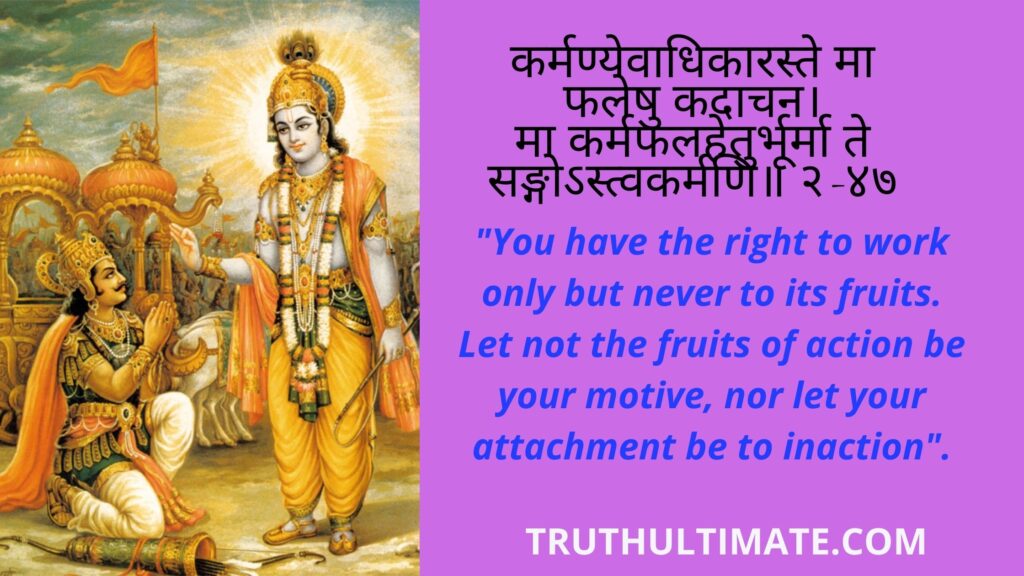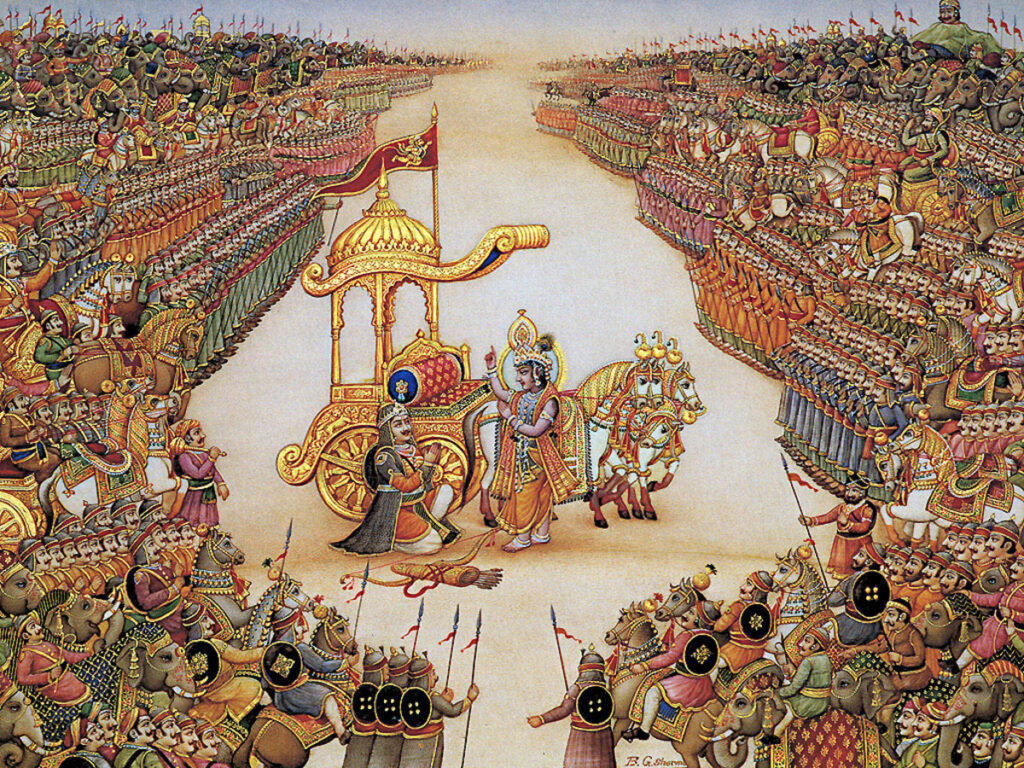Karmanye Vadhikaraste Ma Phaleshu Kadachana | कर्मण्येवाधिकारस्ते मा फलेषु कदाचन is not merely shloka of the holy scripture Bhagavad Gita rather one of the greatest motivational quotes ever for the entire humanity on this universe.
We have seen many slokas and excerpts from the Bhagavad Gita getting famous because of how relatable they are in the modern world.

Bhagavad Gita is not just the Holy book. It can guide you through the difficult phases of life.
Moreover, Bhagavad Gita might be an ancient scripture, but the relatability with modern times can surprise you.
The Bhagavad Gita provides solutions and direction to human life difficulties, as well as equipping you with the wisdom and bravery to live confidently in any part of the globe.

Many Bhagavad Gita readers believe that if you read and understand one sloka of the Bhagavad Gita per day, you would be free of all grief and enlightened.
We all know that sadness and grief are prevalent so much nowadays, and in these difficult times, you can look to the holy Bhagavad Gita for guidance.
Karmanye Vadhikaraste Ma Phaleshu Kadachana | कर्मण्येवाधिकारस्ते मा फलेषु कदाचन
Karmanye Vadhikaraste Ma Phaleshu Kadachana is a popular sloka of the Bhagavad Gita as it is the starting line in Bhagavad Gita’s chapter-2 verse-47.

There is some struggle and some pain necessary behind every successful story.
Hence, we all need to put forth the best of our energy and efforts to get the fruits, and if we are not doing it whole-heartedly, it’s a waste.
Similarly, Karmanye Vadhikaraste Ma Phaleshu Kadachana from Bhagavad Gita also says that you don’t need to worry about the fruits before preparing to do any work.

Obviously, that doesn’t mean that don’t strive for achievements and fruits. Do that, but don’t make it the primary focus and goal.
You should never be inactive, and instead, we should work to bring out the best.
Karmanye Vadhikaraste Ma Phaleshu Kadachana | कर्मण्येवाधिकारस्ते मा फलेषु कदाचन in Sanskrit
कर्मण्येवाधिकारस्ते मा फलेषु कदाचन।
मा कर्मफलहेतुर्भूर्मा ते सङ्गोऽस्त्वकर्मणि॥ २-४७
Transliteration:
Karmanye vadhikaraste Ma Phaleshu Kadachana,
Ma Karmaphalaheturbhurma Te Sangostvakarmani

Translation:
You have the right to work only but never to its fruits.
Let not the fruits of action be your motive, nor let your attachment be to inaction.
Karmanye Vadhikaraste Ma Phaleshu Kadachana | कर्मण्येवाधिकारस्ते मा फलेषु कदाचन full shloka
If we look at the meaning of the whole Karmanye Vadhikaraste Ma Phaleshu Kadachana sloka and break it into parts, you might be able to understand it better.
First Line-First Part:
कर्मण्येवाधिकारस्ते
Karmanye vadhikaraste
- कर्मण्य/Karmanya in the literal sense meaning “In the work”
- एव/Eva means only
- अधिकार/Adhikar translates to right
- ते/Te is your in English
First Line-Second part:
मा फलेषु कदाचन
Ma Phaleshu Kadachana
- मा/Ma translates to No/Not
- फलेषु/Phaleshu means in the fruit/result.
- The root word of this is “Phal” here which means the fruit of work.
- कदाचन/Kadachana means Ever but it has some conflicts regarding the meaning as some articles translate it as “never”.
- Basically, Kadachana means ever and Ma means no, so it combines and becomes “never”.
Second line-First part:
मा कर्मफलहेतुर्भूर्मा
Ma Karmaphalaheturbhurma
- मा/Ma as stated previously means no or not.
- कर्मफल/Karmaphala is the combination of two words, Karma and Phala, which translates to result or fruit of the work.
- हेतु /हेतु here in this sloka means motive.
- But hetu sometimes also means reason as well.
- भु /bhu means be.
Second Line-Second part:
ते सङ्गोऽस्त्वकर्मणि
Te Sangostvakarmani
- ते/Te, as stated earlier, means yours.
- संग /Sang means attachment, and sometimes also means companion.
- अस्तु /Astu translates to Let there be.
- अकर्मणि /Akarmani means “In inaction”.
Karmanye Vadhikaraste Ma Phaleshu Kadachana | कर्मण्येवाधिकारस्ते मा फलेषु कदाचन Pronunciation
Some people write karmanye vadhikaraste as two words, and some write it combined as karmanyevadhikaraste.
Let’s clear all the confusion out as both are fine. But, it’s better that you write it the latter way, as it is in the original text.

It basically is a joined word called Sandhi. (Karmaya+eva+adhikarah+te) is how it is pronounced when written combined.
Karmanye Vadhikaraste Ma Phaleshu Kadachana | कर्मण्येवाधिकारस्ते मा फलेषु कदाचन (Essay in context of Bhagavad Gita ):
You reserve a privilege to play out your recommended obligation, however, you are not qualified for the products of activity.
Never believe yourself to be the reason for the consequences of your exercises, and never be connected to not carrying out your responsibility.
You reserve the option to play out your activities, yet you are not qualified for the products of the actions.
Do not let the organic product be the reason for your activities, and thusly you will not be joined to not doing your duty.

This message was from Lord Krishna to Arjun during the Epic War of Mahabharat when Arjun was unable to perform his duty of battle.
Considering that he had the inverse of him, that a large number of people he considers to be his own.
Arjun says to Krishna, what’s the utilization of battling against my own for simply a real estate parcel.

What joy will I get by killing my dears? The ones on different sides are my own uncle and my cousin. Would I submit wrongdoing?
What will I get by killing every one of them? Rather I would have favored that they kill me here itself.
Then Krishna discloses to him his obligations. The above section, which is among the most renowned refrain in Mahabharat, is one of the clarifications he has given.
In this situation, Krishna lets Arjun know that regardless is the aftereffect of the conflict, he ought not to be stressed over it.
His obligation is to battle; then, at that point, he needs to battle.
He wins or loses that isn’t significant. Regardless of whether he bites the dust during the conflict, he will accomplish paradise since he has effectively played out his duty.

Now going to the second expression of the above sloka, Krishna likewise prompts Arjuna.
That he should never leave the natural product alone the motivation behind his activity, for this situation the activity is his battle and the natural product is possibly he wins or loses.
At the end of the day, he shouldn’t stress over triumph or rout. One side has to lose; hence he should be impartial with regards to it.
In basic terms, it implies, keep on playing out your obligations without being appended to the aftereffect of your activities.
Possibly you get something, or you get nothing; you ought not to stress over it. You ought to have impartial behavior.
If we take an example of a student, he must study only; he passes or fails that is not in his control.
The student doesn’t read up only for finishing his tests; he should study for the learning.
Regardless of whether he passes or fails, he ought not to be too cheerful or so pitiful.
If at any time the student reads up for the sole reason for breezing through his tests, in the end, he has not mastered anything regardless of whether he has passed.
In any case, assuming he studies since he thinks about learning and examining as his obligation, he will not be concerned about whether he will pass or fizzle.
Also, such a student as we have consistently seen is probably going to breeze through their tests.
Except if they can’t arrive at their test for reasons unknown.
Yet he ought not to be tragic with regards to it. Why? Since the most significant is essentially he played out his obligation well.
We can likewise relate this to benevolence, as when we help somebody, we don’t do it for something; consequently, whether or not we are compensated for our activities, this isn’t our worry.
Also when we help somebody without stressing over our own benefits, this is magnanimity.

Lord Krishna already preached to the world that human beings can not sit idle. Even Lord himself would had finish the war of Mahabharata in a moment.
However, he lets all perform each one karma. Karmanye Vadhikaraste Ma Phaleshu Kadachana gives the message and ideals to the generations to follow the right dharma.
If one gets birth here he must have to work this is the eternal order of the universe.
It is philosophically believed that everyone comes here to play his role and return back.
Each one’s karma is scientifically bound by the cause-effect theorem. Each karma has two direct results either liberation or bondage.
If you perform any karma with intention of its fruits- it leads to the bondage of this world.
Here you also do one blunder that you being a creature wants to be the creator by holding the fruits.
You always want to get the desired fruits exactly as you wish as a creator.
On the other hand, if you perform any karma without any worry of fruits-it leads to liberation.

Here you perform karma as your duty and completely surrender it to the almighty or the creator of the universe.
It is like a servant of a shop running the shop the whole day and in the evening he surrenders all the money to his master and forgets.
This seems most difficult, however, the great yogis and masters are like the servants of the shop who completely surrenders everything.
The master is infinite and limitless and so he bestows the rewards to the servants in unexpected and much greater ways.
Sometimes it seems magical for normal human beings and we call those masters and yogis legend on this earth.
Karmanye Vadhikaraste Ma Phaleshu Kadachana meaning
Karmanye Vadhikaraste Ma Phaleshu Kadachana is one of the most popular quotes from the holy Bhagavad Gita in the contemporary world.
Karmanye Vadhikaraste Ma Phaleshu Kadachana means “You have the right to work only but never to its fruits.”
A human being has only karma or duty in his hands and nothing else. The greatest irony starts when human beings decide on the fruits of karma.
Human beings are mere creatures rather than the creator. The creator has the ultimate right to bestow the fruits of karma or duty.
This is the greatest path of karma that leads to liberation or nirvana.
What is Karmanye Vadhikaraste Ma Phaleshu Kadachana ?
Karmanye Vadhikaraste Ma Phaleshu Kadachana is one of the most prominent shlokas from the holy Bhagavad Gita. Karmanye Vadhikaraste Ma Phaleshu Kadachana shloka implies one has the right to work only but never to its fruits. This shloka also implies let not the fruits of action be your motive nor let your attachment be to inaction.
What is the mantra Karmanye Vadhikaraste ?
The great mantra of Karmanye Vadhikarste is taken from the holy Bhagavad Gita. This mantra is part of the powerful shloka Karmanye Vadhikaraste Ma Phaleshu Kadachana which teaches the entire humanity to perform one’s duty without the expectation of its fruit. This mantra leads the path of Nishkam Karma and ultimately to the state of Nirvana.
What is verse 47 chapter 2 Gita?
The verse 47 chapter 2 of Bhagavad Gita reveals the secret of Karmanye Vadhikaraste Ma Phaleshu Kadachana which teaches mankind to do one’s duty as duty sake without any consideration of its fruits. Such Nishkam Karmas cut all the bondages and paves the path to liberation.





